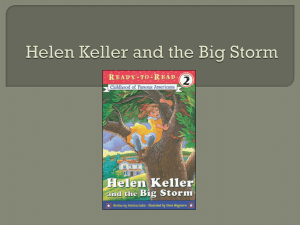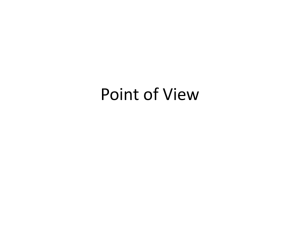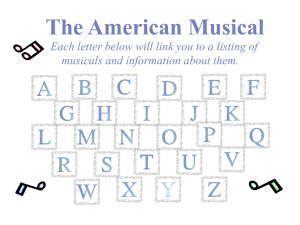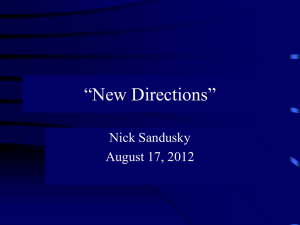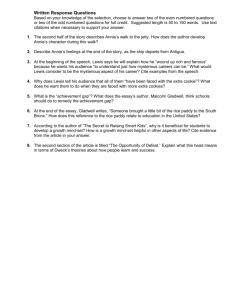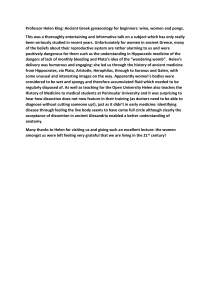Miss Spitfire: Reaching Helen Keller
advertisement
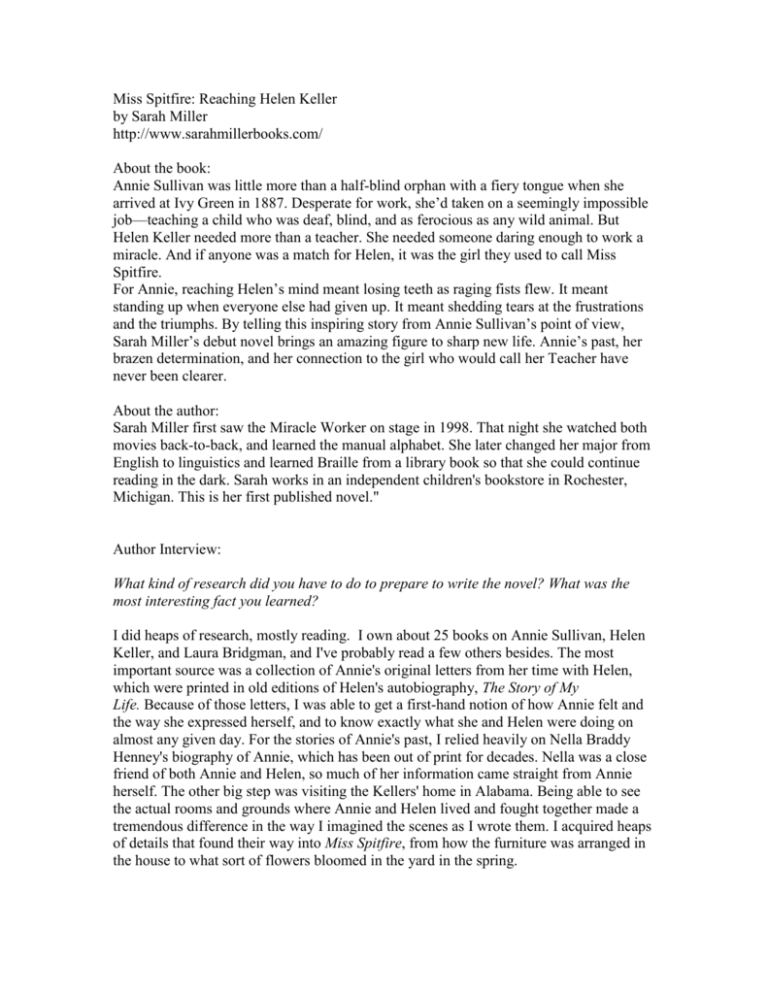
Miss Spitfire: Reaching Helen Keller by Sarah Miller http://www.sarahmillerbooks.com/ About the book: Annie Sullivan was little more than a half-blind orphan with a fiery tongue when she arrived at Ivy Green in 1887. Desperate for work, she’d taken on a seemingly impossible job—teaching a child who was deaf, blind, and as ferocious as any wild animal. But Helen Keller needed more than a teacher. She needed someone daring enough to work a miracle. And if anyone was a match for Helen, it was the girl they used to call Miss Spitfire. For Annie, reaching Helen’s mind meant losing teeth as raging fists flew. It meant standing up when everyone else had given up. It meant shedding tears at the frustrations and the triumphs. By telling this inspiring story from Annie Sullivan’s point of view, Sarah Miller’s debut novel brings an amazing figure to sharp new life. Annie’s past, her brazen determination, and her connection to the girl who would call her Teacher have never been clearer. About the author: Sarah Miller first saw the Miracle Worker on stage in 1998. That night she watched both movies back-to-back, and learned the manual alphabet. She later changed her major from English to linguistics and learned Braille from a library book so that she could continue reading in the dark. Sarah works in an independent children's bookstore in Rochester, Michigan. This is her first published novel." Author Interview: What kind of research did you have to do to prepare to write the novel? What was the most interesting fact you learned? I did heaps of research, mostly reading. I own about 25 books on Annie Sullivan, Helen Keller, and Laura Bridgman, and I've probably read a few others besides. The most important source was a collection of Annie's original letters from her time with Helen, which were printed in old editions of Helen's autobiography, The Story of My Life. Because of those letters, I was able to get a first-hand notion of how Annie felt and the way she expressed herself, and to know exactly what she and Helen were doing on almost any given day. For the stories of Annie's past, I relied heavily on Nella Braddy Henney's biography of Annie, which has been out of print for decades. Nella was a close friend of both Annie and Helen, so much of her information came straight from Annie herself. The other big step was visiting the Kellers' home in Alabama. Being able to see the actual rooms and grounds where Annie and Helen lived and fought together made a tremendous difference in the way I imagined the scenes as I wrote them. I acquired heaps of details that found their way into Miss Spitfire, from how the furniture was arranged in the house to what sort of flowers bloomed in the yard in the spring. I love to get right up to my eyebrows in research, so in addition to all that, I also read Annie's favorite plays and poems, learned Braille, fingerspelling, and ASL, studied up on Irish mythology and folklore, and listened to Irish music. I also listened to Frank McCourt reading his books on CD, because I wanted a feel for what Annie and her family might have sounded like (both the McCourts and the Sullivans came from County Limerick). I even got my hands on a rare video called Helen Keller in Her Story that contains the only known recording of Annie's voice. I watched that more times than I can count. The most interesting fact I came across was probably the story of when Helen nearly married. She fully intended to elope with a man named Peter Fagan, even though her family and Annie herself disapproved of the marriage. As for a fact related to the actual time period when Miss Spitfire takes place, I can tell you I was just as amazed as Annie to find a light fixture in the Keller house that's decorated with a scene of children playing blind man's bluff. What writers have most influences your own work? I'm probably splitting hairs, but I don't have a strong sense that other writers' work influences mine directly. However, I can definitely name some authors who have influenced *me,* which of course shows itself in one way or another in my writing. Robert Fulghum has affected the way I look at the world, and taught me not to overlook what seem like insignificant moments in everyday life. Donna Jo Napoli has a knack for writing exactly the sort of book I love, so in a way, her writing showed me that there is indeed a place for the kind of characters, emotions, and storylines that appeal most to me -- which in turn are the kind of stories I'm most likely to tell. Also, just reading a really great book, no matter who wrote it, is enough to make me push myself to do better, in hopes of reaching the same heights. Lately Wednesday Wars by Gary Schmidt and Aurora County All-Stars by Deborah Wiles are doing the trick. What are you working on now? Right now I'm working on a novel about the four daughters of the last Russian tsar -- the grand duchesses Olga, Tatiana, Maria, and Anstasia. As near as I can figure, I've been interested in the Romanovs since middle school or junior high, but I didn't start seriously researching them until about three years ago. Pre-reading: What is the most difficult job or task you have ever taken on with someone? Why do you think Annie Sullivan agrees to try to work with Helen despite the miracle that will be needed to reach her? Would you be willing to try or not? Why? Discussion Guide: 1. Annie’s history is revealed in bits in pieces throughout the novel. Why do you think the author chose to weave the story of Helen with that of her teacher? 2. What do you learn about Annie that is surprising? Do you think her past contributed to her success as Helen’s teacher? What is the most heartbreaking part of Annie’s own story? 3. What are Annie’s first impressions of Helen and the other Keller family? How do you think they view her? How important do you think first impressions are? Why? What types of things do you predict about someone when you first meet them? 4. What are Helen’s manners and behavior like when Annie first arrives? What strengths does she have? Give examples of how Helen shows her intelligence despite her physical limitations. 5. “…words bridge the gaps between two minds. Words are a miracle. (p. 40) Do you agree with Annie? Can you imagine a life without words? How does Helen process her world without them? 6. Annie is nearly as frustrated with the adult Kellers as she is with Helen. Why? Do you think they contribute to Helen’s disability? Do you think you would be tough like Annie or more lenient like Mrs. Keller? What makes you think so? How is she finally able to convince them of her methods? 7. Why does Annie understand the anger and frustration that Helen feels and displays? Do you think you would have similar outbursts or not? Why? 8. Are you surprised the by fierce, physical nature of the battles between Helen and Annie? Do you think any other method might have succeeded? Do you think children who are similarly disabled today are trained in a similar method? 9. Why must Annie remove Helen from her home to gain control of her? How does it work? Describe their days in the cottage. How does Percy add a new dimension to Helen’s education? 10. Annie turns to the doll she brought for Helen often at the end of the long days. Why? What ends up happening to it? Why don’t the two share any affection? When does this finally change? Would you be willing to work such long hours and days without break or recognition? 11. How do the Keller’s threaten to undo all the hard work Annie has achieved? What are the two things Helen’s parents can’t seem to tolerate in their daughter’s treatment? Do you believe in corporal punishment? Why or why not? 12. Annie recognizes that Helen’s repetition of spellings is only mimicry rather than real understanding. How does she know? Have you ever read words but not understood their meaning? Is this similar? What is real understanding? When does Helen achieve it? Do you remember when reading cracked open its understanding for you? Projects: History: Create a timeline of Annie or Helen’s life based on the novel and your own research. Include pictures if possible. -orResearch the historical treatment of people with disabilities and create a timeline based on what you learned. Language arts: In honor of Annie Sullivan, “Teacher,” write a letter to the teacher who most influenced and inspired you. -orCreate a Venn diagram comparing Annie and Helen. Think critically about what they have in common and what makes them different. Science: Research the common causes and treatments for blindness and deafness. What technical and surgical advances have recently been made? This guide was created by Tracie Vaughn Zimmer, a reading specialist and author of Reaching for Sun from Bloomsbury. Visit her website to find hundreds of guides to children’s literature. http://www.tracievaughnzimmer.com
